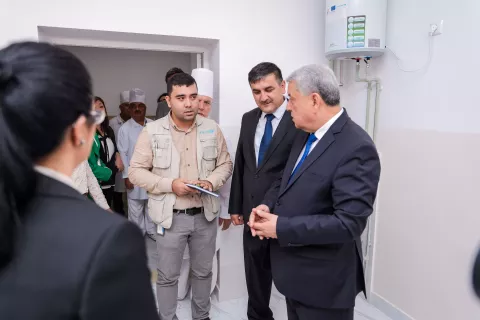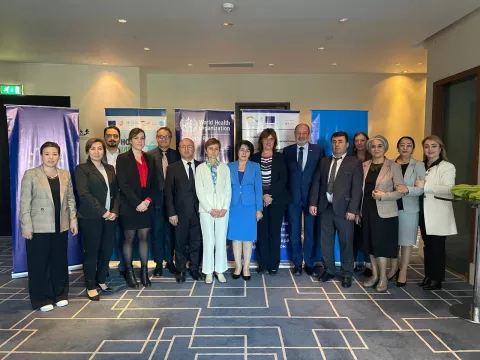More than 90 babies die every week in Europe and Central Asia from causes associated with air pollution
UNICEF recommends governments to adopt Air Quality Standards in line with the WHO Air Quality Guidelines, as air pollution is now a prominent cause of death among children across the region

GENEVA, 5 September 2023 – More than 5,800 children and teenagers in Europe and Central Asia died in 2019 from causes related to air pollution. The vast majority – 88 per cent – died before their first birthday, according to a new data analysis featured in a policy brief published today by UNICEF.
“When it comes to air pollution, the tiniest lungs carry the heaviest burden, wreaking havoc on children’s health and development, sometimes costing them their lives,” said Regina de Dominicis, UNICEF Regional Director for Europe, and Central Asia.
“Reducing air pollutants and children’s exposure to toxic air is critical to protecting their health and their societies, leading to reduced health care costs, improved learning, increased productivity and a safer, cleaner environment for all.”
Breathless beginnings: the alarming impact of air pollution on children in Europe and Central Asia notes that children exposed to air pollution are at an increased risk of severe health problems including acute respiratory infections such as pneumonia, particularly dangerous for babies and young children. In Tajikistan too, poor air quality puts young children’s health at risk.
“Clean air is not only a right, but an essential need for good health and development. It is important to protect our young children from the impact of air pollution at all times.” noted Anthony Asije, Chief of Child Survival at UNICEF Country Office in Tajikistan.
Breathing polluted air causes long lasting damage to children’s lungs, leading to an increased risk of asthma and chronic respiratory and cardiovascular illnesses and diseases including cancer. Air pollution can lead to neurological disorders later in life as a result of early damage to children’s brains, notes the policy brief.
Children are physically more exposed to air pollution than adults because they breathe twice as fast and often by mouth, taking in more pollutants. They are often closer to the ground where pollutants are accumulated. Children are physiologically more vulnerable to air pollution than adults because their brains, lungs and other organs are exposed to inflammation and damage during a period of rapid development, the brief notes.
In Europe and Central Asia, air pollution – PM 2.5 and PM 10 – is mostly caused by residential and commercial practices including the use of coal and other fossil fuels for heating and cooking. In Tajikistan seasonal wind-blown dust regularly affects Dushanbe and other regions.
To prevent worsening air quality, UNICEF urges governments to strengthen policies and investments to expedite the transition to clean, efficient energy and transport across all sectors. This includes supporting energy efficiency and access to clean energy, training primary health care professionals to screen children and detect air pollution-related illnesses, and scaling up and expediting plans to reduce air pollution at national and municipal levels.
To protect children from exposure, UNICEF calls on governments to set up and maintain air quality monitoring systems near kindergartens and schools, and report information to the public, noting levels of air pollution that are dangerous to children and pregnant women.
UNICEF Tajikistan encourages all parents and caregivers to regularly monitor air quality through the internet and free to download applications. Parents and caregivers should also closely monitor weather reports and identify poor air quality days when young children should minimise their outdoor activity.
During periods of poor air quality, windows, and doors in the home and in schools should remain closed until air quality levels are acceptable. Both children, parents and caregivers should wear approved face masks with the ability to filter fine particulate matter if venturing outdoors during period of poor air quality.
#####
Notes to editors
The regional estimates are based on a new analysis of data from the Global Burden of Disease 2019. New global data will be released by UNICEF later this year.
UNICEF welcomes the proposal by the European Commission to introduce new ambitious air quality standards and calls for the Members of the European Parliament to adopt the text with standards that are in full alignment with the WHO Air Quality Guidelines by 2030.
For more information, please contact:
Georgina Diallo, UNICEF Europe and Central Asia Regional Office, Tel: +41 76 320 68 14, gdiallo@unicef.org
Daler Dodojonov, UNICEF Tajikistan Communications Officer, Tel: +992 939990096 ddodojonov@unicef.org
Media contacts
About UNICEF
UNICEF promotes the rights and wellbeing of every child, in everything we do. Together with our partners, we work in 190 countries and territories to translate that commitment into practical action, focusing special effort on reaching the most vulnerable and excluded children, to the benefit of all children, everywhere. UNICEF operates in Tajikistan since 1993.
To receive more information about UNICEF and our work in Tajikistan, please visit https://www.unicef.org/tajikistan/
Follow UNICEF on Facebook, Instagram and Twitter




